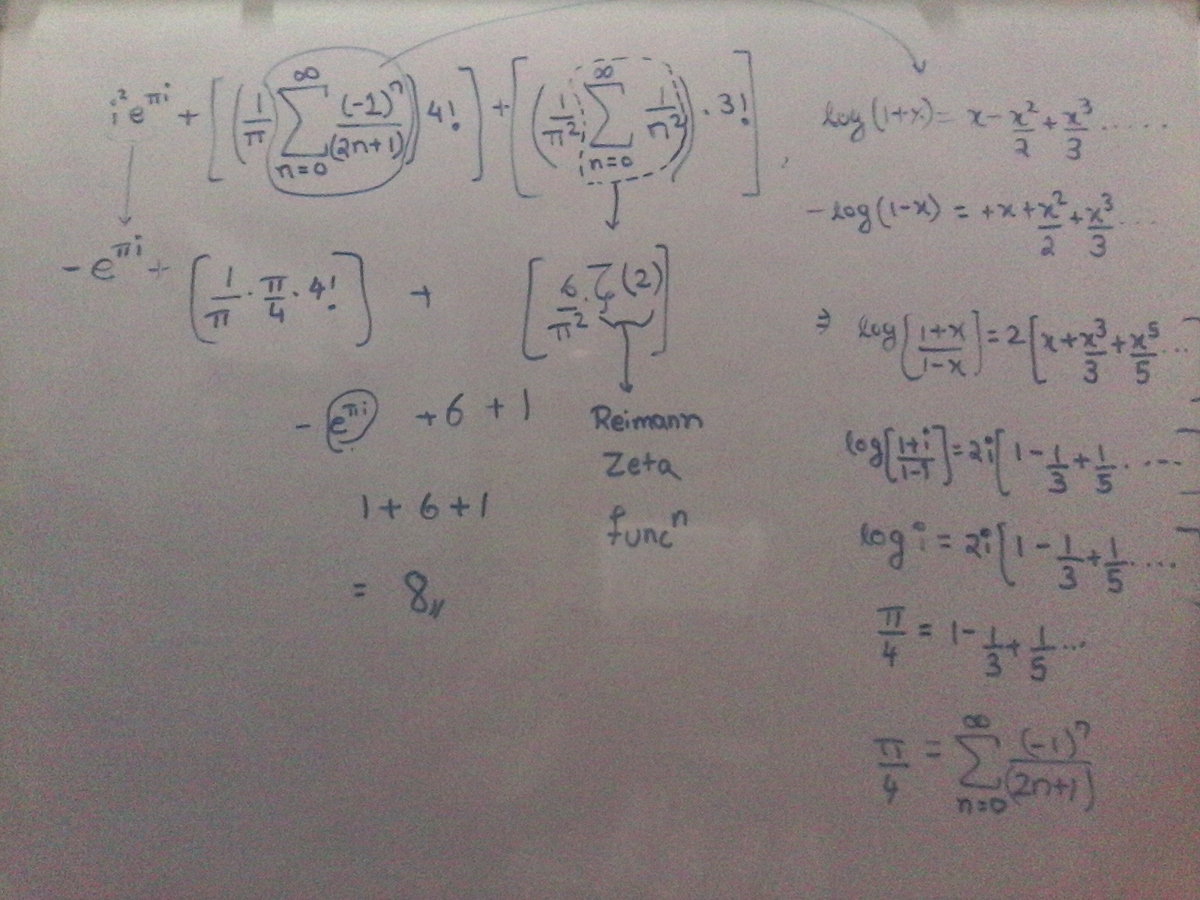It was delicious

Recently, a friend of mine went to a restaurant. The above image shows a portion of the receipt, which includes the amount he tipped as well as the total amount he paid. How much did the food cost?
Clarification: The total amount reads $33.82. Also, the second summation should have a lower limit of 1, not 0.
The answer is 27.82.
This section requires Javascript.
You are seeing this because something didn't load right. We suggest you, (a) try
refreshing the page, (b) enabling javascript if it is disabled on your browser and,
finally, (c)
loading the
non-javascript version of this page
. We're sorry about the hassle.
3 solutions
The tip given can be solved by following steps: S u m = = = = = = = 3 i 2 e i π + ⎝ ⎛ π 4 ! n = 0 ∑ ∞ 2 n + 1 ( − 1 ) n ⎠ ⎞ + ⎝ ⎛ π 2 3 ! n = 1 ∑ ∞ n 2 1 ⎠ ⎞ + 3 ! 4 ! 3 1 + ⎝ ⎛ π 4 ! n = 0 ∑ ∞ 2 n + 1 ( − 1 ) n ⎠ ⎞ + ⎝ ⎛ π 2 3 ! n = 1 ∑ ∞ n 2 1 ⎠ ⎞ + 4 3 1 + ⎝ ⎛ π 4 ! n = 0 ∑ ∞ 2 n + 1 ( − 1 ) n ⎠ ⎞ + ( π 2 3 ! 6 π 2 ) + 4 3 1 + ( π 4 ! 4 π ) + ( π 2 3 ! 6 π 2 ) + 4 3 1 + 6 + 1 + 4 2 + 4 $ 6 Using Euler’s identity e i π + 1 = 0 we get i 2 e i π = 1 Basel’s problem n = 1 ∑ ∞ n 2 1 = 6 π 2 Assigning 1 in t a n − 1 x = x − 3 x 3 + 5 x 5 … we get t a n − 1 1 = 4 π So as the total bill was of $ 3 3 . 8 2 including the tip and food charges,
F o o d F o o d c h a r g e s = 3 3 . 8 2 − 6 c h a r g e s = $ 2 7 . 8 2
 I wish I could go to this hotel I did the part which looks difficult hope you all can do the rest and reach answer
I wish I could go to this hotel I did the part which looks difficult hope you all can do the rest and reach answer
The tip is given by
3 i 2 e i π + ⎝ ⎛ π 4 ! n = 0 ∑ ∞ 2 n + 1 ( − 1 ) n ⎠ ⎞ + ⎝ ⎛ π 2 3 ! n = 1 ∑ ∞ n 2 1 ⎠ ⎞ + 3 ! 4 !
i 2 e i π = − 1 × i 2 = 1
Consider,
n = 0 ∑ ∞ 2 n + 1 ( − 1 ) n
We know that , tan − 1 x = x − 3 x 3 + 5 x 5 … ,assigning x = 1 ,we get the reqired sum = tan − 1 1 = 4 π
also we have ,
n = 1 ∑ ∞ n 2 1 = ζ ( 2 ) = 6 π 2
plugging these values back into the equation we get
T I P = 3 1 + ( π 4 ! 4 π ) + ( π 2 3 ! 6 π 2 ) + 3 ! 4 ! = 3 1 + 6 + 1 + 4 = 6
Thus cost of food= Total cost- Cost of tip = 3 3 . 8 2 − 6 = 2 7 . 8 2